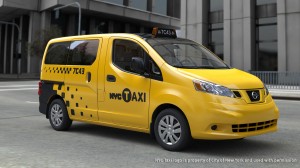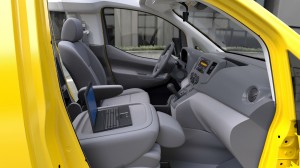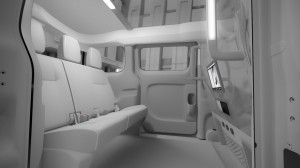 Nissan has clinched the contract to provide the NV200 van for the New York City taxis fleet. ?The exclusive arrangement, which was jointly announced Tuesday, (May 3) by Mayor Michael Bloomberg and Nissan Americas Chairman Carlos Tavares calls for the Nissan van to go into service as the current fleet is replaced, starting late in 2013.
Nissan has clinched the contract to provide the NV200 van for the New York City taxis fleet. ?The exclusive arrangement, which was jointly announced Tuesday, (May 3) by Mayor Michael Bloomberg and Nissan Americas Chairman Carlos Tavares calls for the Nissan van to go into service as the current fleet is replaced, starting late in 2013.
The NV200 is being hailed as the ?Taxi of Tomorrow? ushering in a new era in urban mobility for the nation?s largest taxi fleet.
The award comes after a rigorous selection process that occurred over more than two years. The competition built upon more than a century of taxi industry heritage to drive the design and creation of a purpose-built vehicle, tuned to the city?s streets. The other two finalists included Ford Motor Co. and Karsan, a Turkish vehicle manufacturer.
?Nissan is proud to provide the next generation of taxis for the City of New York,? said Tavares. ?The NV200 taxi will give Nissan the opportunity to showcase our dedication to vehicle quality and urban mobility to more than 600,000 passengers every day.?
The Nissan NV200 taxi, which is about the same size as a Ford edge, will be produced in North America at Nissan?s facility in Cuernavaca, Mexico. The Nissan NV200 taxi will be a modified version of the compact commercial vehicle currently available in global markets including Japan, Europe and China. Total manufacturer suggested retail price (MSRP) of the vehicle, with all planned standard features, will be around $29,000.
As part of the program, Nissan also will work with the City and taxi owners on a pilot program to study the use of zero-emission, electric vehicles as taxis. Nissan will provide up to six 100-percent electric Nissan LEAFs to taxi owners for testing in 2012 as well as the charging stations to support their use.
 ?The city?s Taxi of Tomorrow is the Nissan NV200 ? and it?s going to be the safest, most comfortable and most convenient cab the city has ever had,? said Mayor Bloomberg. ?We started this process to leverage our taxi industry?s purchasing power to get the highest quality taxi, one that that can expand and redefine the legendary image of New York City taxicabs. The new taxis will be custom-designed to meet the specific demands of carrying 600,000 passengers a day in New York City traffic and the vehicle meets the top priorities identified by the public in our on-line survey.?
?The city?s Taxi of Tomorrow is the Nissan NV200 ? and it?s going to be the safest, most comfortable and most convenient cab the city has ever had,? said Mayor Bloomberg. ?We started this process to leverage our taxi industry?s purchasing power to get the highest quality taxi, one that that can expand and redefine the legendary image of New York City taxicabs. The new taxis will be custom-designed to meet the specific demands of carrying 600,000 passengers a day in New York City traffic and the vehicle meets the top priorities identified by the public in our on-line survey.?
Planned innovations, which respond to direct input from drivers, owners and passengers, include:
- 2.0L 4-cylinder powertrain, engineered to enhance the emission performance and fuel efficiency of the taxi fleet;
- Ample room for four passengers and their luggage, substantially improved over current taxi models;
- A low-annoyance horn with exterior lights that indicate when the vehicle is honking, helping reduce noise pollution;
- Sliding doors with entry step and grab handles, providing easy entry and exit;
- Transparent roof panel (with shade) that will provide unique views of the city;
- Independently controlled rear air conditioning with a grape phenol-coated air filter to improve cabin air quality;
- Attractive, breathable, antimicrobial, environmentally friendly and easy-to-clean seat fabric that simulates the look and feel of leather;
- Overhead reading lights for passengers and floor lighting to help locate belongings;
- A mobile charging station for passengers that includes a 12V electrical outlet and two USB plugs;
- A six-way adjustable driver?s seat that features both recline and lumbar adjustments, even with a partition installed;
- Standard driver?s navigation and telematics systems.
 Nissan also focused on passenger safety when designing the NV200 taxi. Key safety features include:
Nissan also focused on passenger safety when designing the NV200 taxi. Key safety features include:
- Front and rear-seat occupant curtain airbags, as well as seat-mounted airbags for the front row;
- Standard traction control and Vehicle Dynamic Control (VDC);
- Sliding doors to reduce the risk of pedestrians, cyclists and other motorists getting struck by doors opening unexpectedly;
- Lights that alert other road users that taxi doors are opening.
With more than 13,000 taxis traveling a cumulative 500 million miles per year, durability was a key factor in the ?Taxi of Tomorrow? selection process. Nissan will train taxi fleet operators to conduct routine in-house service and repairs, and Nissan Commercial Vehicle dealers will provide prompt service by providing the first available service bay to taxi operators needing service.








